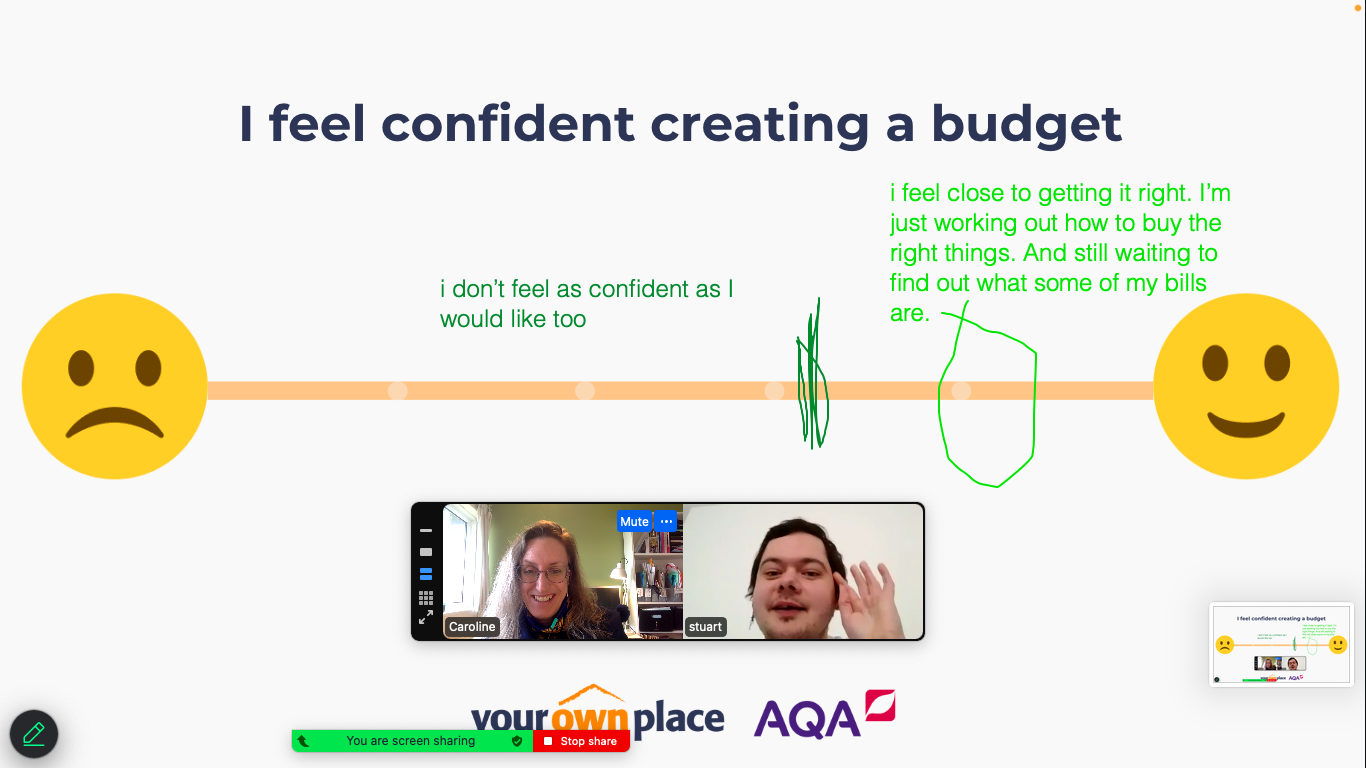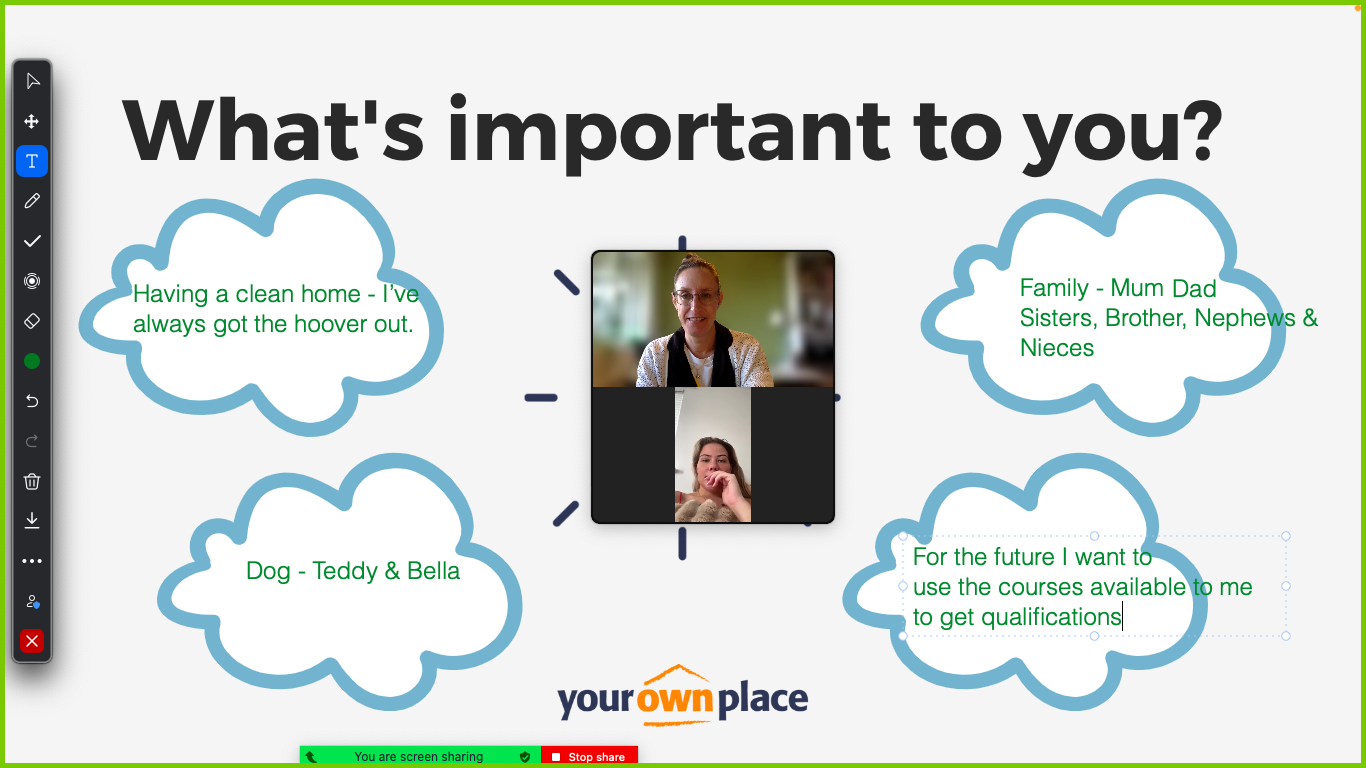Each quarter a member of the Your Own Place team is going to share an insight into their role at Your Own Place and what they have recently been up to as part of it. This quarter Facilitator, Caroline shares about her experience in navigating the realm of online delivery in a world where Zoom fatigue can easily take over.

It’s no exaggeration to say that when I was asked to be the Facilitator leading a project delivered solely online, my heart sank. Using video calls during the pandemic had been unfulfilling and draining for me. I experienced a feeling of dread at the potential of a “relapse” to those experiences of quiet squares with muted mics, black screens, and the eerie absence of the informal cues I rely on in person. In the course of the last year and a half as a Facilitator at Your Own Place, I’ve embraced online delivery, flipped my mindset and developed my techniques to make online delivery more engaging, interactive, and responsive to the needs of all participants, myself included.
I’ve worked intentionally to ensure online delivery doesn’t feel disembodied or transactional. Remaining human and approaching each session with an intention to lead with Your Own Place’s values at the core and adding my own strong belief in compassion and authenticity. Our Zoom sessions are a space of trust, connection, growth, and sharing our human experiences.

1# Recognise the Power of Relationship in Digital Spaces
For me, the heart of impactful online delivery is one foundational principle: relationships matter.
Whether facilitating a group or 1-2-1 workshop, how I show up matters. It’s taken me time to really embody this belief; embracing the ‘relationship first’ approach was amongst my mindset shifts. For a while, early in my Your Own Place career, I put content first, prioritising the topic; I quickly realised the importance of investing time to build a relationship. Knowing when talking about how the person is and what’s on their mind, rather than the content I’d planned, was far more impactful. It meant I could better understand the whole person and establish greater trust. I’ve found this shift has deepened relationships and made content more relevant and meaningful by grounding it in real-life experiences, adding far more value to sessions.
In digital environments, I’ve learned that relational work takes extra effort, and it’s worth it. A warm welcome, a genuine check-in, a simple acknowledgement when someone shows up despite a chaotic day. Meaningful gestures go a long way. They remind us all, we’re not just participants – we’re people who matter.
2# Meet People Where They’re At
Zoom fatigue is real. I believe it’s where I was when first asked to lead online delivery. So is digital overload; it can feel like “everything” is online. Parenting during meetings, or juggling two jobs while trying to stay present in a workshop, is a common experience. I’ve found online spaces can magnify life’s complexities and distractions. That’s why, at the heart of equitable and restorative online delivery, it’s so important to meet people where they are.
For me, this means:
– Starting sessions with open, unifying questions: “What do we need today to be present in this workshop?”
– Normalising the need to step away or keep cameras off without judgment.
– Checking in rather than checking up; choosing a phone call instead of Zoom if needed.
Meeting participants where they’re at isn’t about lowering expectations — it’s about acceptance. As a Facilitator, it’s an honour to be invited into people’s homes, to become part of their day and to witness the humanity behind the screen.

3# Be Genuine
In a culture obsessed with polished presentations and curated virtual personas, I believe the best thing I can do, in my Facilitator role, is to be real. Sharing my vulnerability and owning my mistakes creates opportunity for real connections. I’ll laugh at my tech mishaps and openly admit when I don’t have all the answers. My hope is that it gives others permission to be themselves too, opening the door for more honest conversations, which deepen the learning and hopefully lead to long-lasting change.
Final Thoughts…
Taking the extra time to get online delivery right means being the difference that avoids another bland, draining digital meeting. I believe our approach to online delivery can shift someone’s mindset about attending online sessions, meaning they may be more open to accessing similar opportunities in the future.
Online delivery means being welcomed into someone’s home, their safe space – recognising and respecting that further builds trust and strengthens connection. In a world that often feels fragmented and transactional, let’s make video calls a place of human-ness and connection.

